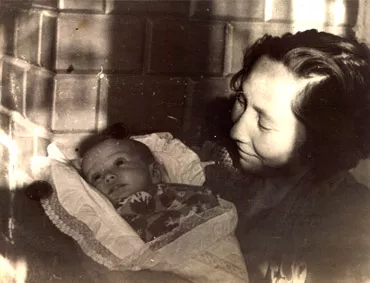Lubov Rozenfeld with her mother Sophia Rozenstein
My father photographed my mother and me by our tiled stove. I am few months old. Signed on the backside: 'Luba Rozenfeld with her mother - Sophia Rozenstein'. Kiev, 1939.
At 14 my mother went to work as a courier at the sugar supply office in Kiev. She attended an amateur performers' club. She told me they studied singing, dancing, dressing and washing there. They staged play and had lots of fun. My mother used to say: 'Who would have I become if it hadn't been for the revolution? would have sold things at the market in the sticks'. My mother had a strong voice. She went to study singing at a music school and later - at the College of music and Drama. After finishing this college my mother went to work as chief editor of music radio programs at the radio committee where she met my future father Mikhail Rozenfeld. They registered their marriage at a registry office in 1935. They were atheists and didn't have a Jewish wedding. In 1936 their son Alexandr Rozenfeld was born. My mother was chief editor of music radio programs at the radio committee. She spent a lot of time at work and Alexandr was raised by nanny Frosia Kostyuk, a Ukrainian woman. I was born on 17 December 1938 in Kiev. We lived in Bratskaya Street in Podol: my mother, father, my brother Alexandr, I and Frosia in one room with the windows facing the Dnieper. I remember that we had a tiled stove and my father stoked it with wood. I hadn't turned three when the Great Patriotic War began. My mother said my father was released from army service as a RATAU employee. My father could evacuate his family. I have dim memories about our trip across the Ural in a freight train for coal transportation. Frosia told me that I was black with coal and when the train stopped she took me off the train to wash me. During air raids my brother screamed: ‘I don’t want to be killed by a bomb!’ When the train stopped during air raids, we jumped off to hide in the fields. We arrived at Vereschagino (about 2 thsd. km from Kiev) Molotov region. I remember that we lived in a wooden house on the 2nd floor. There was a green meadow near the house. My father worked in a railcar depot for a short time and then he volunteered to the front. My mother was chairman of a kolkhoz. They manufactured clay pots and she brought some home to cook in them. Somebody made us a steel stove with exhaust holes at the bottom. I put sticks in the stove and lit them and could see flames through the holes.
In early 1944 the radio committee called for my mother from the evacuation. We went back in a freight train. It was cold and we had to burn my brother's skis. He cried a lot after them. We also sailed a boat along the Volga and I remember my mother trading clothes for food products. She gave me a piece of white brick-shaped bread with a lump of sugar: this was an incredible luxury. Then we took a train again. When we returned to Kiev, it was ruined. My mother received a dwelling from the radio committee in the very center of Kiev in Kreschatitskiy Lane. In the past it housed a brothel: on the 4th floor on both sides of a long dark curved corridor there were 11 square meter rooms. We received two rooms.


















